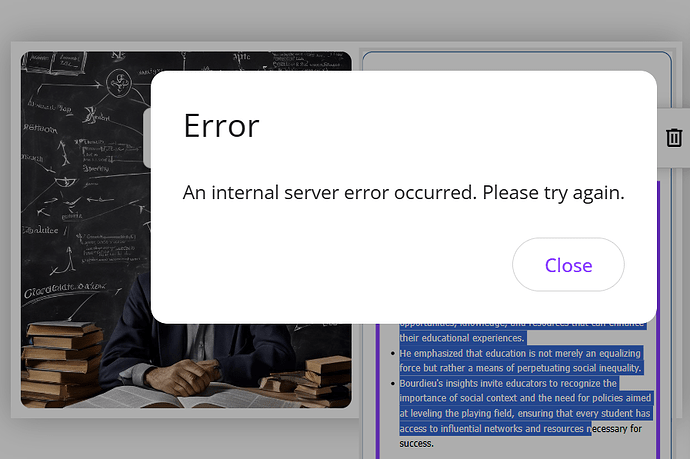Clementine,
The news that you are thinking of adding some feature to work with documents is excellent. The AI interaction with documents is intriguing. The output of, say, UPDF or PDFGear even on a single pass is quite something. However, the real task is to have a conversation with the output in order to give the AI room to work through what it has. If you translate that to the issues in Upresenter there is ‘middle layer’ -
(a) The AI processes the PDF.
(b) the conversation with that output takes place (middle layer)
(c) the decision to suggest that the outcome of that conversation is used to make a slide.
But I have tried using ‘custom prompt’ in the ASK AI feature we you have added. Surprisingly, it produced a summary of an article - I only gave the bibliographic reference asking it for an annotated bibliography entry. I have tried it with a few references. It seems Ask AI can access these articles!
Ask AI -
Hart, C.S. (2019) ‘Education, inequality and social justice: A critical analysis applying the Sen-Bourdieu Analytical Framework’, Policy Futures in Education, 17(5), pp. 582–598. Available at: https://doi.org/10.1177/1478210318809758.
“This article critiques the intersection of education, inequality, and social justice through the application of the Sen-Bourdieu Analytical Framework. Hart argues educational outcomes are intertwined deeply with social and economic disparities, highlighting the role of agency and structural factors. The article discusses how the integration of Sen’s capabilities approach with Bourdieu’s theories on social capital provides a nuanced understanding of educational inequities.
The research method includes a qualitative analysis of existing literature and case studies, which supports the theoretical framework by illustrating real-life implications of educational policies on marginalised groups. Hart’s approach emphasises the significance of social context in education, making a case for policy reforms that priorities equity and inclusivity.
This article contributes to the academic discourse by bridging theoretical perspectives with practical implications, advocating for a more holistic understanding of education as a tool for social justice. It encourages policymakers and educators to consider how structural inequalities influence educational experiences and outcomes, thus fostering critical discussions on the need for systemic change in the education sector.”
This effort by Ask AI (on a custom prompt) is surprisingly effective as a first pass. (I have tweaked the English a tad) - it seems to have been as effective if not more effective than a first pass on other systems.
To utilise the prompt, you need to pick some element in an Upresenter slide - and use it as a place to build the entry. - To display the entry, one would need to create a new slide (not blank) and add the entry copy and paste.
However, if the new entry is highlighted again a further custom prompt can be made - on that content. So I asked Ask-AI to reorganise the output as “summary, analysis, evaluation” - it produced
Summary: This article explores the capability approach in the context of education, outlining its significance in assessing educational outcomes beyond traditional metrics. Hart argues that education should empower individuals to enhance their capabilities, which is essential for promoting social justice and equality.
Analysis: The author provides a critical examination of existing educational frameworks and suggests that incorporating the capability approach can lead to a more holistic understanding of educational success.
Evaluation: This work contributes to the broader discourse on educational theory and policy, making it a vital resource for educators, policymakers, and researchers interested in the intersection of education and social theory.
*** so ASK AI seems to have quite a lot of promise.
I thought to add this to a new thread as the one with Matthias is diverging a bit.
